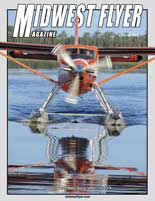by Dave Weiman
LANSING, MICH. – The Great Lakes Aviation Conference at the Lansing Center in Lansing, Michigan, February 14-15, 2014, included seminars for aircraft technicians for inspection authorization (IA) refresher training…seminars for pilots…and an exhibition hall packed with vendors and organizations.
Among the speakers were Mark R. Baker, President and CEO of the Aircraft Owners & Pilots Association (AOPA); Barry D. Cooper, Administrator, FAA Great Lakes Region; Art Mortvedt, pilot/adventurer; and Ret. General John Borling, who was shot down in Vietnam in 1966 and spent the next six years and eight months composing a book of poems, which he has now publish called “Poems From The Hanoi Hilton.”
Administrator Cooper told the group of pilots that they were a different group than he is used to meeting with. Usually, Cooper is meeting with airport managers and state aviation officials, especially on the topic of federal funding of airports. He told the group that it was nice to finally have a budget to work with, referring to the delay in getting the FAA budget appropriated.
“I don’t envy the position Congress is in, “ said Cooper. “Trying to save money, cut costs and run the country.” Cooper said that some areas within the FAA will have to be cut. He also addressed the progress being made with “NextGen,” or the Next Generation Air Transportation System, noting that the deadline for aircraft to have Automatic Dependent Surveillance-Broadcast (ADS-B) out equipment is still January 1, 2020.
As for the future of VORs, Cooper said that stations in the eastern two-thirds of the country will be pretty much decommissioned, but there’s no specific timeline. Currently, there are 967 VORs in the U.S. This number will eventually be reduced to 500.
AOPA President & CEO Mark Baker spoke of the “sleep apnea” controversy; the proposal to eliminate the “third-class medical;” the heavy-handedness lately of some U.S. Customs & Border Protection officials who have searched aircraft for no apparent reason; reauthorization of the FAA budget and the need for the agency to prioritize services, rather than increase user fees; and what can be done to reduce the cost of flying.
Concerning the proposal by the FAA to require sleep apnea tests, Baker sees this as a waste of time and money when pilots should instead be putting their limited resources towards flight safety. He hopes to require the FAA to put the proposal through the “rule-making” process, which will delay – and hopefully eventually – kill it.
In regards to concerns with U.S. Customs & Border Protection, Baker noted that Homeland Security has a $65 billion annual budget, and that there are “double standards” when it comes to how the agency deals with aircraft, compared with boats.
Regardless of the issue, Baker said that the 233-member “Aviation Caucus” carries a lot of weight in dealing with the FAA and Homeland Security.
Concerning the decline in the pilot population, Baker wants to “reactivate” those pilots who are no longer current. He sees this as the fastest way to grow the pilot population. Baker also sees “flying clubs” as the most affordable means for pilots to fly, and thereby a longer term solution to increasing the number of pilots.
Whatever the issue general aviation may be facing, Baker stressed the importance and positive impact when Congress hears from their constituents.
“When I think you need to write a letter to your Congressman, please do it,” said Baker. “It is still the most effective lobbying tool we have.”
For additional information on the Great Lakes International Aviation Conference, refer to www.GreatLakesAviationConference.com.










